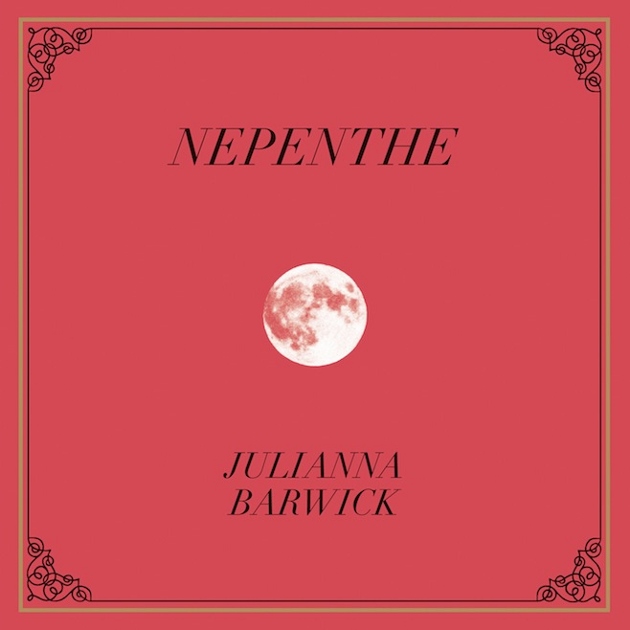Julianna Barwick must feel like she’s living one of her dreams right now. She recently cancelled a string of solo shows so she could accompany and open up for Sigur Rós, a band she’s always had a great love for. She recalls in an interview the first time she saw them live: “[It was] one of the best concerts I’ve ever seen; I couldn’t get it out of my system for days, I couldn’t even talk afterwards.” But not only has she been given the chance to travel about and play with some of her favourite musicians, she also got to record her music in the same setting as the Icelandic band. For her new album, Nepenthe, she travelled to Iceland to record with Sigur Rós collaborator Alex Somers, as well as a string of the country’s other well-known musicians, such as members of múm and Amiina. Working to create and produce her own solo material with the help of others, it’s no surprise that she sounds different here compared to her beautiful and lush 2011 sophomore album, The Magic Place.
On Nepenthe, Barwick takes some of the focus away from her voice and makes a brave step forward to expand her palette without drifting too aimlessly into distraction. Here her voice melds and melts into its surroundings, which come in the form of quivering strings, all-girl choirs, and a rich well of sonic details. “The Harbinger” carefully lifts itself up from scratching effects with glistening piano chords and flourishes into an affecting, if not hypnotizing crescendo that genuinely feels comforting; “Adventurer of the Family” flutters by in a similar fashion as Barwick’s voice washes over tremolo violin strings before smoothing them out into lush sweeps that bring the track to its end. The format of Barwick’s songs hasn’t changed in the way they often unfurl and unspool with a mystifying ability that sounds entirely natural, but on Nepenthe she mines something that brings a different and fresh kind of dynamism to the mix.
An easy accusation is that this new dynamism is merely a form of imitation, which isn’t entirely incorrect. There’s no denying that Barwick sounds more like her new tourmates than ever before: the decayed piano and airy feel captured on “Crystal Lake,” and the patient strings on closing track “Waving to You,” sound like they were culled from Valtari while the ominous unsettling atmosphere on “Pyrrhic” could well fit somewhere into this year’s Kveikur. The aforementioned sonic details even bring to mind the sounds from the Icelandic band’s full career, from the embryonic wails on “Pyrrhic” to the creaking doors on “Forever.” But all of it together feels like silent nods to the band, if not just direct inspiration (Nepenthe was recorded in the Sundlaugin Studio, after all) that thankfully never falls foul to coming off as plagiaristic. As said, Barwick is moving forward here, exploring new textures and sounds and what she can do with her voice and vocal techniques, and she’s fortunately been able to couple herself with complimentary sounds. She did reach out on moments during The Magic Place (the stunning “Prizewinning” always sticks out in my mind), but she spent more time focusing and refining the mood and place she captured (which, of course, was no bad thing). Here she explores again but reaches outwards, bringing her surroundings to her instead of sounding like she’s wandering around in one place.
Another feature Barwick manages to capture is that of grief. Nepenthe’s recording sessions were cut in two due to a family grievance, and often it can sound – if not actually feel – like she’s trying to sort out the darkness in her mind. On the opening track, “Offing,” she presents a series of vocal loops that, if anything, show Barwick has mastered her talent. It’s tinged with sadness, but it’s not until the next track starts fading in that we begin to feel the sorrow coming through. From there she wanders between a hopeful kind of optimism (the gorgeous “One Half,” were we get some tangible words that could easily be interpreted as the description of someone waiting by a phone to hear news: “I guess I was asleep that night whilst waiting for…”) and being lost in darkness (the aforementioned “Pyrrhic”). Even though wordless for the most part, Nepenthe creates a sense of heaviness and despair; while The Magic Place was definitely best suited to soundtracking the sunrise of dewy summer morning, Nepenthe is contrastingly an album for dusk, when the light is fading and the landscapes go silent.
But by the end of the forty minute journey, Barwick does sound like she’s worked though her dark thoughts, if not resolving them in a way that again comes off optimistic. Even during the album’s thicker moments, like when she’s got a choir backing her on “Labyrinthine,” or “Forever,” where her voice sounds like it has become everything, she’s still there, somewhere in the centre – not lost, but just taking in her surroundings. It’s easy to imagine her gazing at Iceland’s natural beauty and her own music accompanying such an image (Icelandic Tourist Board, I hope you’re listening), but as clichéd as such connotations are, they help add to the bigger picture. The striking photos Barwick captured during her stay show that she was undeniably impressed, if not overwhelmed by the country’s natural beauty, but it’s important to remember that inside her are a series of voices waiting to be expelled – voices that are caught up in grief and doubt. That’s what she’s captured here, and with the help of others, she’s refined it and given it more texture and context than she’s caught on tape before. Nepenthe isn’t The Magic Place, but it certainly sounds like she’s found another special site of inspiration. Thankfully for us it’s just as prodigious and marvellous as anything else Barwick has put out before.


